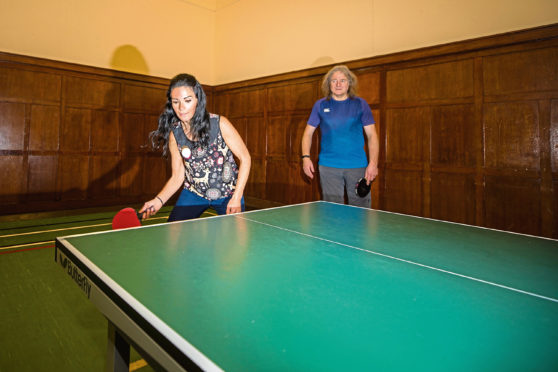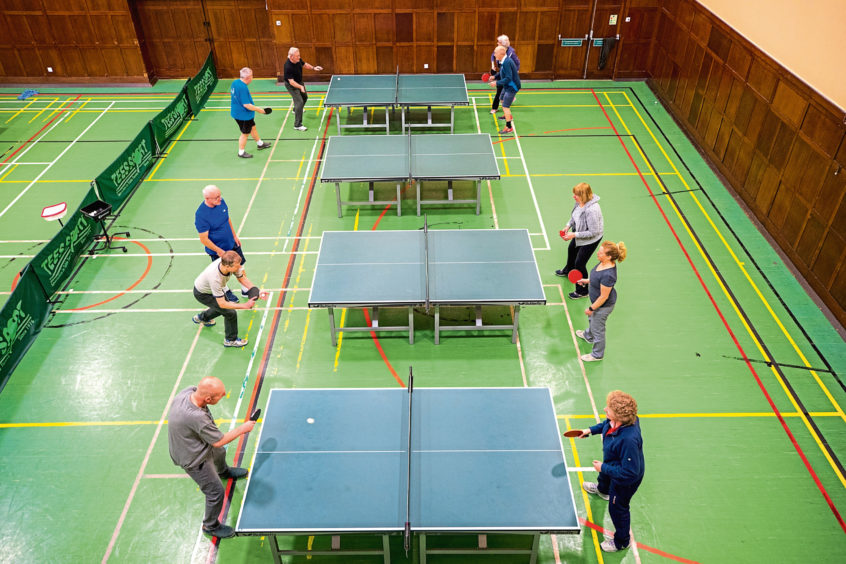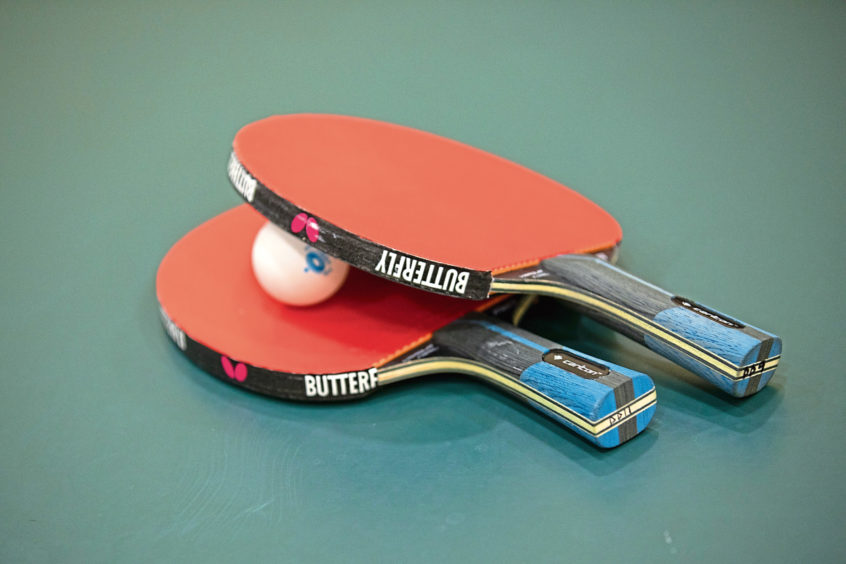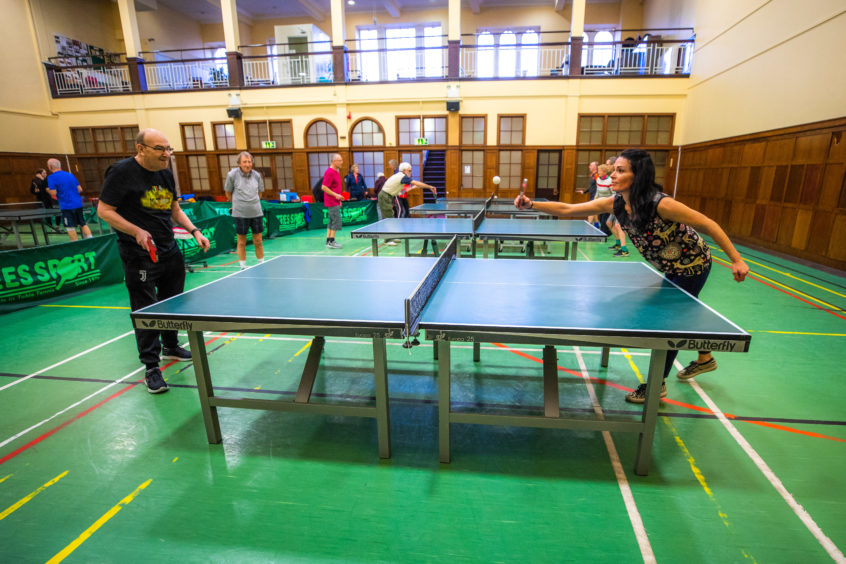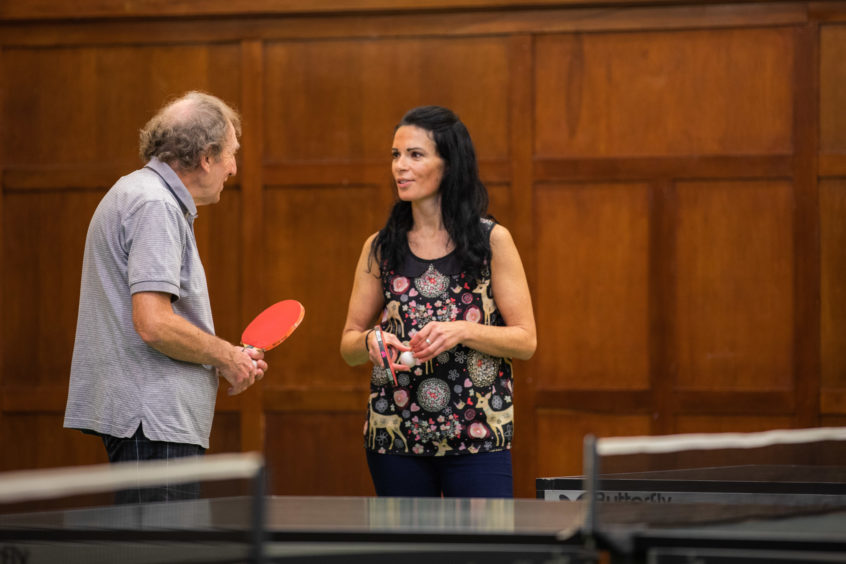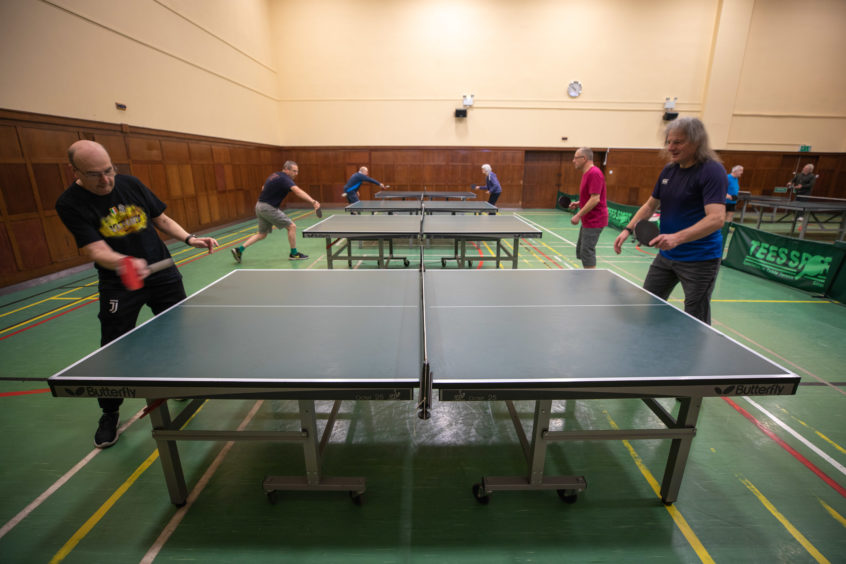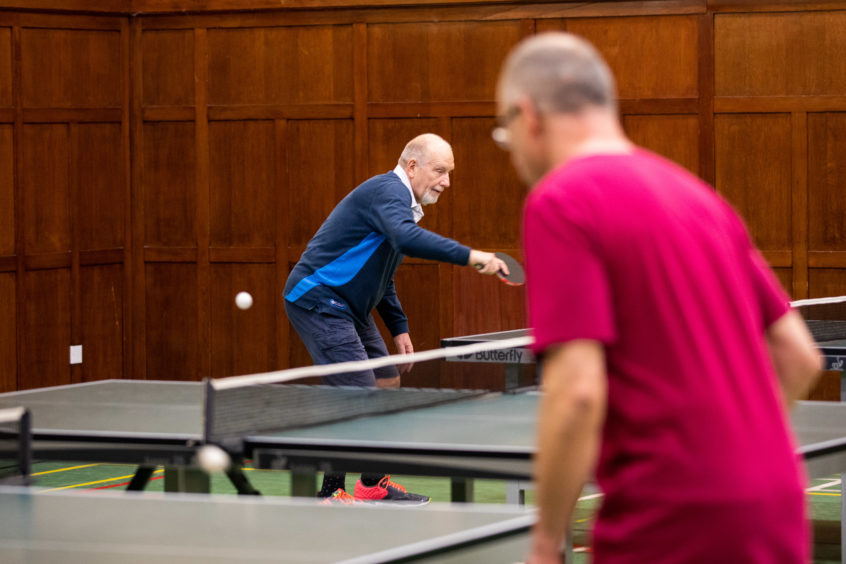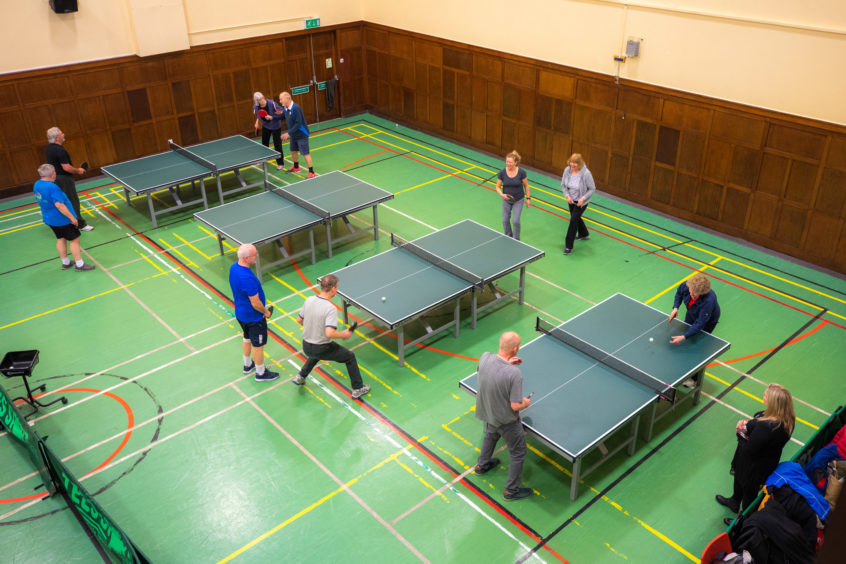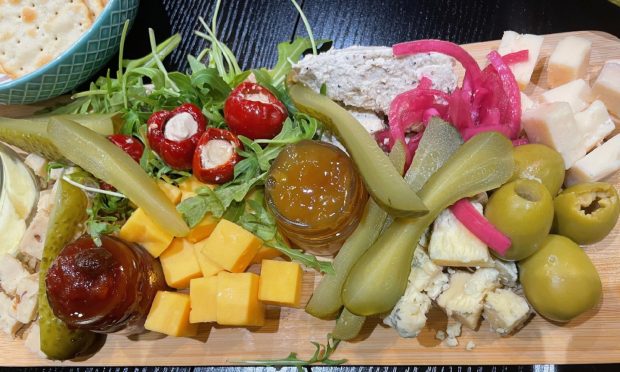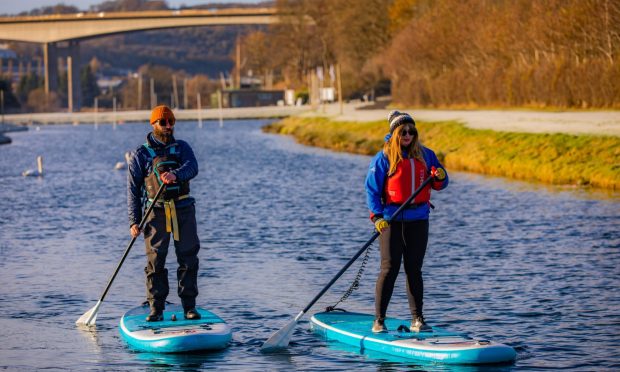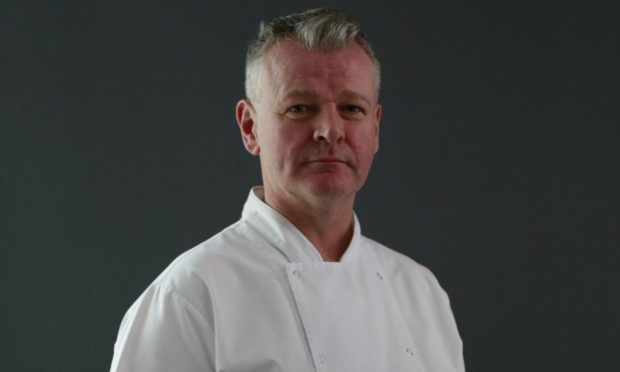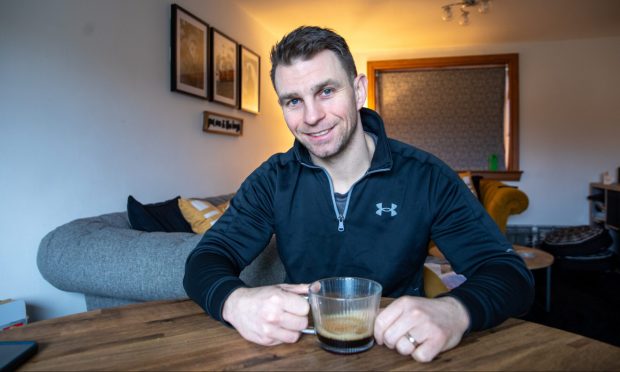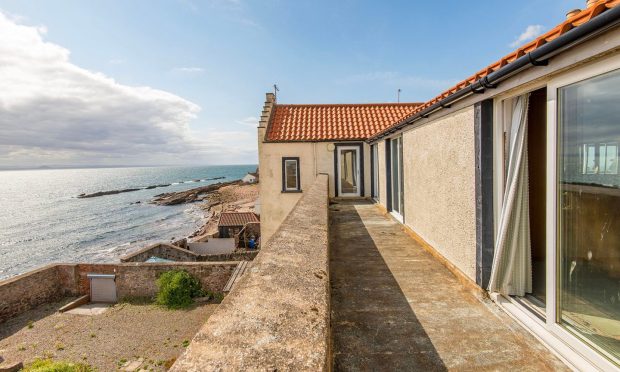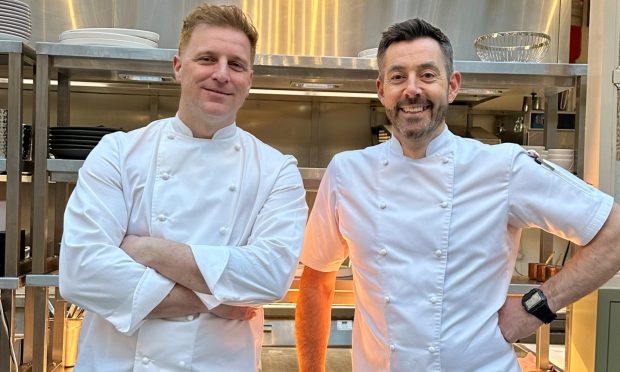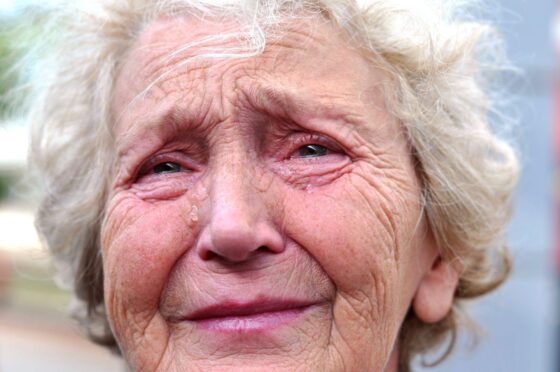Think table tennis is just a fun game? Gayle has a bash and discovers a real sport with a dedicated following worldwide…
I am useless at tennis, badminton and squash – pretty much all racket sports.
Having not played table tennis since I was a teenager at a youth club in Aberdeenshire, I imagined I’d be pretty useless at this, too.
However, I was pleasantly surprised to find myself being described as “a natural” when I took part in a session with Dundee and District Table Tennis Association (DDTTA) last week.
Okay, so I was fairly rubbish initially, my body ramrod stiff and my forehand drive nonexistent, but after a few minutes, I loosened up and seemed to get the hang of things.
I’d been invited along to Friday morning training at Dundee’s Ward Road Gym, where people of all ages (but mostly over 50) and abilities were joining in.
Former Scottish table tennis champion – and chair of DDTTA – Elaine Forbes took me under her wing, along with committee member Arthur Pritchard.
“All you need is trainers and a smile,” said Elaine, checking out my suitably-clad feet, before we headed to a table.
“Have a few games with Jim Kelly and see how you get on.”
Jim, 61, had only been playing for a few weeks but revealed he’d come on in leaps and bounds under the watchful eyes of experienced coaches.
“It’s good playing with folk over 50 because it’s exhausting running round the table against kids!” he grinned.
“People here are really friendly and don’t take things too seriously. It’s great for keeping fit and kind on the joints, unlike running.
“It’s inspirational knowing there are people playing here in their late 80s.”
The aim of the game is simple: you hit the ball over the net onto your opponent’s side.
You win a point if your opponent is unable to return the ball to your side of the table, either by missing it, or if they hit the ball but it misses your side of the table, or if the ball hits the net, or if they hit the ball before it bounces on their side of the table.
After Jim and I had hit a few balls across the table, and missed quite a few, Arthur, a retired head teacher, strolled across to offer some advice.
“Move around a bit more and use a ‘hoovering’ motion across the table,” he suggested, his long hair bouncing round his shoulders as he demonstrated.
“You’re pretty good at your backhand swing but you need to work on your forehand drive. Try to lift your racket up more and keep it parallel.”
Within minutes, I had improved hugely and it was at this point that Jim proclaimed I was “a natural”. Even if that was a lie, I thank you, Jim!
Between us, Jim and I kept the ball up in the air for a good few minutes, which I considered not bad at all.
However, retired maths teacher Ken Head revealed that he and Arthur could happily keep the ball from dropping for “around an hour”.
“We’ve been playing for years so we can do it without thinking,” he beamed.
“In fact, would you like to see Arthur and I play fast?” Well, of course!
I stood back and watched in awe as the two men went head to head and indeed, the ball seemed as if it would be eternally airborne. What impressed me most, however, was the speed at which it flew through the air.
“Table tennis is a bit of a ‘hidden’ sport and doesn’t get much publicity,” said Arthur. “It has so many benefits, both physical and mental.
“There’s a lot of bending down to pick up balls, it’s good for your reflexes as reactions have to be quick, and it boosts mental sharpness. But while anyone can play, it’s a high skill sport that takes years to become good at.”
Aged eight, Elaine enjoyed her very first game of table tennis at a Butlins holiday camp in Ireland. That was more than 50 years ago.
“It was something I could compete on equal terms with my older brother and sister in a pretty competitive family,” she said.
“I love how the sport can be played by both men and women on a level playing field at local league level and enjoyed by all age groups.”
Elaine is a big advocate for the sport’s health and social benefits.
“Doctors have been known to prescribe table tennis rather than dish out medication tablets,” she said.
“There’s an increase in motor skills, cognitive awareness and flow of blood to brain and it’s thought it could help prevent dementia and Alzheimer’s.
“It’s really friendly and our sessions are a great way to socialise and meet other people of all ages. People here are always smiling!
“Lots of folk are competitive but it doesn’t have to be that way. The focus can simply be on having fun and keeping the ball on the table if you work with a partner, as opposed to competing against someone who’s trying desperately to beat you.
“We have people of all ages, from youngsters up to those in their 80s.”
Elaine believes it’s important that newcomers play against and learn from the best players.
“We like to mix folk of different abilities,” she added. “But we really do have people from all backgrounds, with different stories.
“We have carers, foreign students, those recently bereaved or who are feeling isolated, or it might just be that someone simply comes along for the fun of it in their lunch break. The main thing is – everyone is welcome.”
info
Dundee and District Table Tennis Association (DDTTA) runs sessions at Ward Road Gym. On Thursdays, coaching sessions open to all ages and abilities run from 6pm to 8pm, on Fridays over-50s social sessions runs from 10am to 12 noon and there’s an open practice from 7pm to 9pm.
On Mondays, there are social sessions for over-50s (run by Plebeians Table Tennis Club) at Forthill Community Sports Club from 9.30am to 11.30am, and then there’s open practice from 7pm to 9pm. For more details about DDTTA, see ddtta.co.uk or email chairman@ddtta.co.uk
